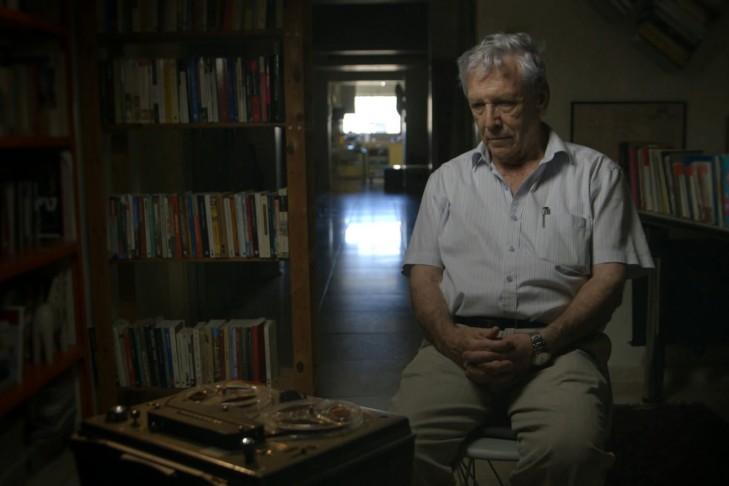“In the war we all became murderers,” says a then-young veteran of Israel’s iconic Six-Day War. The war, which began in June 1967 with Israel fighting Egypt, Jordan and Syria for its very survival, ended with the recapturing of the Old City of Jerusalem and part of the Golan Heights, as well as the occupation of the West Bank, Gaza Strip and Sinai Peninsula. The veteran is among the more than dozen intimate and powerful voices recorded in the immediate aftermath of the war. Their raw impressions and fresh memories are showcased in the starkly intense documentary “Censored Voices.”
Just a week after the war, the writer Amos Oz and his colleague, Avraham Shapira, traveled to kibbutzim across the country with a borrowed reel-to-reel tape recorder to document their fellow veterans’ complicated feelings about the war. In the film, Shapira explains that the kibbutz was the perfect incubator for discovering an alternative narrative of the war. To tell the story cogently and effectively, Oz and Shapira tapped into “the sadness that could only be felt in the kibbutz because we were living so close to each other.”
It was a daring project given the sense of triumphalism in the country and the lionization of its soldiers. Early in the film, Oz asserts that the recordings are decidedly not intended “to be a victory album.” Indeed, these testimonials capture the underbelly of the war, which includes an early ambivalence about the occupation of Palestinian territories, as well as accounts of Israelis executing prisoners of war. One veteran recalls, “They never said, ‘Leave no one alive,’ but they said, ‘Show no mercy.’ The brigade commander said to kill as many as possible.” For another veteran, evacuating Arab villages reminded him of his family’s treatment in Europe at the hands of the Nazis.
Until the making of “Censored Voices,” only 30 percent of the taped testimonials were available to the public and subsequently collected by Shapira in a 1971 book, “The Seventh Day: Soldiers Talk about the Six-Day War.” While the book was a bestseller in Israel, the censored audiotapes remained under lock and key with Shapira.
It wasn’t until Mor Loushy, the film’s 32-year-old director, came across a copy of Shapira’s book while doing other historical research that she realized the existence of the tapes. In several published interviews, Loushy has indicated she was fascinated by the tone of Shapira’s book because it notably diverged from the history lessons she learned in school. She eventually convinced Shapira of the importance of sharing all of the tapes—access that he previously denied to myriad journalists and historians.
Another jolting narrative in the film includes eyewitness accounts of retaking the Western Wall in Jerusalem. A number of veterans testified that reaching the Wall was anti-climactic. For one veteran, it called into question the very definition of holiness. Another quotes a grieving mother, whose son died fighting for Jerusalem, saying that, “The Western Wall wasn’t worth his fingernail.” For Oz, taking back East Jerusalem was “a breaking down of boundaries” where, despite having grown up in Jerusalem, he felt like the archetypal stranger in a strange land. Oz and others remarked on the difficulty and humiliation of coming into contact with Arab civilians in Jerusalem versus encountering enemy soldiers in the desert.
Just as riveting as these testimonials is watching each man listen to his younger self on tape. They sit alongside the recorder, sometimes closing their eyes in deep thought or cringing at memories. As the film progresses, the reel-to-reel tape becomes its own character in the documentary—a silent witness to the complexities of young men fighting a war.
Yossi Klein Halevi—whose 2013 book “Like Dreamers” followed the lives of a group of Six-Day War veterans—cautions against using the documentary as a defense for 21st-century critics of Israel. In a New York Times article, Halevi is quoted as asserting that: “If there were isolated acts of abuse by our soldiers, that should not become the narrative about what the Six-Day War was about. Many of us here are, frankly, sick and tired of the blame-Israel-first narrative.”
And yet Oz declares that those newly revealed admissions of violent behavior by a generation that came to represent a strong, resilient Israel shed a different light on an important moment in Israel’s history. “I feel we spoke the truth,” Oz says at the end of the 84-minute film, “a truth I stand by to this day.”
“Censored Voices” will be presented at the Museum of Fine Arts, in partnership with the Boston Jewish Film Festival, on Sunday, March 20, at 6:30 p.m. Click here for more information.



